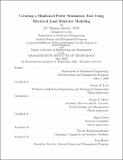Creating a shipboard power simulation tool using electrical load behavior modeling
Author(s)
Deeter, Thomas,Lieutenant(Thomas Andrew)
Download1191659793-MIT.pdf (3.995Mb)
Other Contributors
Massachusetts Institute of Technology. Department of Mechanical Engineering.
System Design and Management Program.
Massachusetts Institute of Technology. Engineering and Management Program.
Advisor
Steven B. Leeb, Bryan R. Moser and Daisy Green.
Terms of use
Metadata
Show full item recordAbstract
Trends in power system simulation that demand computationally-intensive, physics-based models may impede the acquisition of useful results for applications like condition-based maintenance [1], electrical plant load analysis (EPLA) [2], and the scheduling and tasking of finite generation and distribution resources. A tool that can quickly evaluate many scenarios, as opposed to intense, high fidelity modeling of a single operating scenario, may best serve these applications. This thesis presents a behavioral simulator that can quickly emulate the operation of a relatively large collection of electrical loads, providing "what-if" evaluations for more complete exploration of a design or plant operating envelope. Comparisons to field data collected from a microgrid on-board a 270 foot US Coast Guard "Famous" Class medium endurance cutter demonstrate the utility of this tool and approach. The usefulness of this tool is further demonstrated by showing simulated EPLA load factors within 10%of observed load factors over comparable mission sets, both inport and underway. Finally, this thesis will discuss the lessons learned during SPS development and testing, specifically, the need to expand its modeling capability so it can support direct current (DC) electrical distribution systems. The SPS, in its current form can only model alternating (AC) electrical distribution systems.
Description
Thesis: Nav. E., Massachusetts Institute of Technology, Department of Mechanical Engineering, May, 2020 Thesis: S.M. in Engineering and Management, Massachusetts Institute of Technology, System Design and Management Program, May, 2020 Cataloged from the official PDF of thesis. Includes bibliographical references (pages 625-626).
Date issued
2020Department
Massachusetts Institute of Technology. Department of Mechanical Engineering; Massachusetts Institute of Technology. Engineering and Management ProgramPublisher
Massachusetts Institute of Technology
Keywords
Mechanical Engineering., System Design and Management Program., Engineering and Management Program.